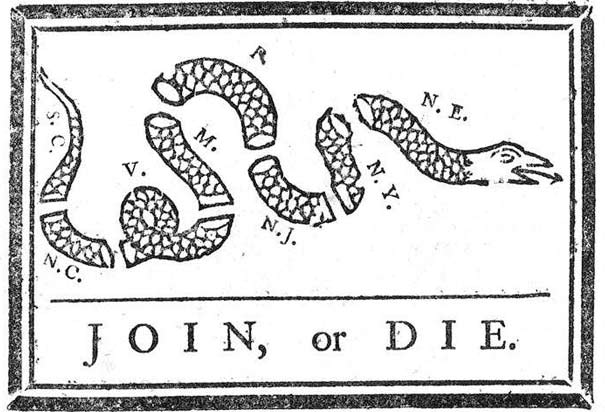U.S. History I - Periods 1, 5, and 6:
Essential Questions:-How did early American settlements influence democracy during colonial life?
-How was the first permanent English settlement in North America established in 1607?
-What influence did geography play in the settlement?
Themes: Mercantilism, Colony-building, economic relationships
1. North America Map - circa 1713
2. America and it’s Colonies - What questions gave you problems? Let's discuss the content in this article and the primary source cartoons.
3. Please analyze the Join or Die Cartoon below and answer the two questions that follow.

This cartoon, published by Benjamin Franklin on May 9, 1754 in the Pennsylvania Gazette. (Photo Credit: Library of Congress)
Questions:
A. What is the key message in this statement?
B. What do the 8 segments represent on the snake and why are there only eight segments on the snake?
4. America and it’s Colonies and then read Chapter 3 - Section 1 - England and it's Colonies - pages 66-71 and complete the handout British Laws - Positive and Negative.

5. We will quickly review the major differences between Agricultural South and The Commercial North during the colonial period of American History. Illustrates should have been completed on the Venn Diagram.
Homework:
1. Study Guide for your Test tomorrow - Thursday, September 25th:
Chapter 2-
Jamestown Settlement
joint-stock company
Powhatan Tribe
Headright system
Puritans + New England settlement (Massachusetts Bay Colony)
Purtians leave - Roger Williams and Anne Hutchinson
Pequot Wars + Metacom/King Phillips War
Middle Colonies - Quakers, William Penn, Where are they?
Chapter 3
Mercantilism
The 13 Colonies - what did they offer? Raw materials? Labor?
Navigation Acts
The Glorious Revolution's effect on the Colonist - salutary neglect + "Power of the Purse"
The Great Awakening: George Whitefield and the European Enlightenment (idean of government, natural laws, John Locke + Jean Jacques Rousseau).
The Agricultural South vs. the Commercial North
The French-Indian War - I will give you a quiz on this section - So it will NOT be on your Test tomorrow.
___________________________________________________
U.S. HISTORY II - Period 4:
U.S. Curriculum Essential Questions:
-Was American expansion overseas justified?
-Did the press cause the Spanish-American War?
-Was the acquisition of the Panama Canal Zone an act of justifiable imperialism?
-Does the need for self-defense give the US the right to interfere in the affairs of Latin America? (Think about the Roosevelt Corollary, "Dollar Diplomacy," and "Watchful Waiting")
Themes: Individualism, Diversity, PEGS (Political, Economic, Geographic, Social)
1. The Panama Canal Resources:
Video on the construction of the Panama Canal
2. What were the Foreign Policy missions of President Theodore Roosevelt, William H. Taft, and Woodrow Wilson called and give ONE prime example of each policy. (Hint: You may use pages 568-571 in your textbook or
3. Teddy Roosevelt Resources:
Theodore Roosevelt - A PBS special on TR's Foreign Policy Adventures
Teddy Roosevelt Association - Lots of pictures and stories of keeping his legacy alive.
Progressive President's Foreign Policy - U.S. State Department
Teddy Roosevelt's Broad Powers - A pretty darn good essay
Whitehouse.org - Theodore Roosevelt Number 26
Theodore Roosevelt: Progressive Crusader - The Heritage Foundation of American Leadership
President Theodore Roosevelt Video - Similar to the ones we watch in class!! A must see!
4. William Howard Taft - The White House website
William Taft - VERY NICE biography and legacy page from the University of Virginia
Presidential Video on William Howard Taft - Just like the ones we watch in class!! A must see!
5. President Woodrow Wilson Video - Youtube clip from a teacher on Taft AND Wilson.
Woodrow Wilson - The White House org
Woodrow Wilson Biography - from the University of Virginia
Homework:
1. Test tomorrow on Chapter 18 - America's rise to power and Imperialism at the turn of the 20th Century. Please study for this 1st test of the year.
_____________________________________________________
International Studies - Period 2
Essential Questions:
1. What does international studies mean?
2. How do people create permanent change in a global world?
1. We will continue to examine the United Nations using the UN Website and a UN slideshow.
2. Ban-Ki-Moon - Secretary-General of the United Nations
3. United Nation Resources:
United Nations History
United Nations Multimedia Room
United Nations School bus Virtual Field Trip
United Nations Research Guide A-Z on EVERYTHING you can imagine!
United Nations Peacekeeping Missions
University of California organized a UN resources guide - Honestly, the BEST and more ORGANIZED I have seen yet on how to research issues concerning the United Nations.
1. None.
No comments:
Post a Comment